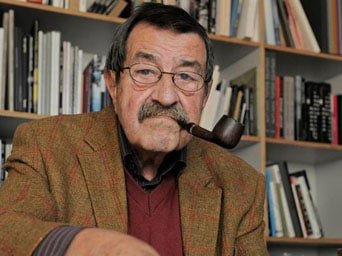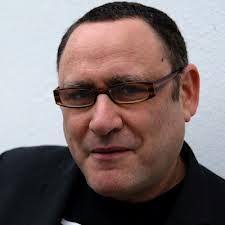By Gilad Atzmon
Outrage in Germany, Nobel Laureate Günter Grass has, once again told the truth about Israel being the greatest threat to world peace.
Günter Grass, Germany’s most famous living author and the 1999 recipient of the Nobel Prize in Literature, sparked outrage in Germany on Wednesday with the publication of a poem, “What must be said,” in which he sharply criticizes Israel’s offensive approach towards Iran.
Once again, it is the artist rather than the politician, who tells the truth as it is. Once again it is the Artist rather than the academic who speaks out.
“Why did I wait until now at this advanced age and with the last bit of ink to say: The nuclear power Israel is endangering a world peace that is already fragile?” Wrote Grass.
In the poem, published by Germany’s Süddeutsche Zeitung newspaper and other European dailies on Wednesday, Grass also calls for an
“unhindered and permanent monitoring of Israel’s nuclear potential and Iran’s nuclear facility through an international entity that the government of both countries would approve.”
Israel and some German Jewish prominent voices were quick to react. The Israeli Embassy in Berlin issued a statement offering its own version of ‘What must be said.’
“What must be said is that it is a European tradition to accuse the Jews before the Passover festival of ritual murder,” the statements reads.
Pretty outrageous, don’t you think? In the open Israel together with its supportive Jewish lobbies (AIPAC, AJC) are pushing for a new global conflict. Yet, shamelessly the embassy defies criticism tossing in the air the old blood libel. The appropriate timely question here is why Israel and AIPAC are pushing for a world war and a potential nuclear conflict just before Passover? Can they just wait for another Yom Kippur (atonement day)?
The Israeli Embassy continues,
“in the past, it was Christian children whose blood the Jews allegedly used to make their unleavened bread, but today it is the Iranian people that the Jewish state allegedly wants to annihilate.”
Isn’t it really the case? Every military expert suggests that Israeli pre-emptive attack on Iran could escalate into a nuclear conflict. If anything Grass tries like others, including your truly, to prevent Israel from celebrating its lethal symptoms once again.
The Israeli embassy noticed though that “Israel is the only state in the world whose right to exist is openly doubted.”
Correct, and so it should be. Israel is a racist, expansionist state, it doesn’t have room amongst nations.
The Central Council of Jews in Germany also called the poem an “aggressive pamphlet of agitation.”. I wonder, is it really aggressive to try and restrain an aggressor?
The German newspaper Die Welt, which apparently obtained an advance copy of Grass’ poem, published a response by rabid Zionist Henryk Broder, the country’s most prominent Jewish writer. “Grass always had a problem with Jews, but it has never articulated it as clearly as he has in this poem.” Broder said “Grass has always had a tendency toward megalomania, but this time he is completely nuts.” I would expect Germany’s leading Jewish writer to come with something slightly more astute.
Border however may be correct when he notes that Grass is “haunted by guilt and shame and also driven by the desire to settle history, he is now attempting to disarm the ’cause of the recognizable threat.’”
Wednesday’s poem is not the first time Grass has come out with critical views of Israel. In a 2001 interview with SPIEGEL ONLINE, he offered his own solution for the Israeli-Palestinian conflict.
“Israel doesn’t just need to clear out of the occupied areas,” he said at the time. “The appropriation of Palestinian territory and its Israeli settlements are also a criminal activity. That not only needs to be stopped — it also needs to be reversed. Otherwise there will be no peace.”
Broder contends that such a statement is “no less than a demand for Israel to not just cede Nablus and Hebron, but also Tel Aviv and Haifa. ” he continues, “Grass does not differentiated between the ‘occupied areas’ of 1948 and 1967.” Needless to say that from an ethical perspective Grass is correct-there is no difference between 1948 and 1967. The Jewish State located itself on historic Palestine on the expense of the Palestinian people. I guess that Grass understood already in 2001 that the Jews only State must be transformed into a ‘State of its Citizens’. Israel should embrace the true notion of peace, universalism and inclusiveness. But I guess that we shouldn’t hold our breath for it is not going to happen soon.
Gilad Atzmon’s New Book: The Wandering Who? A Study Of Jewish Identity Politics Amazon.com or Amazon.co.uk.

Gilad Atzmon is an Israeli-born British jazz saxophonist, novelist, political activist and writer.
Atzmon’s album Exile was BBC jazz album of the year in 2003. Playing over 100 dates a year,[4] he has been called “surely the hardest-gigging man in British jazz.” His albums, of which he has recorded nine to date, often explore the music of the Middle East and political themes. He has described himself as a “devoted political artist.” He supports the Palestinian right of return and the one-state solution in the Israeli-Palestinian conflict.
His criticisms of Zionism, Jewish identity, and Judaism, as well as his controversial views on The Holocaust and Jewish history have led to allegations of antisemitism from both Zionists and anti-Zionists. A profile in The Guardian in 2009 which described Atzmon as “one of London’s finest saxophonists” stated: “It is Atzmon’s blunt anti-Zionism rather than his music that has given him an international profile, particularly in the Arab world, where his essays are widely read.”
His new book The Wandering Who? is now availble at Amazon.com
ATTENTION READERS
We See The World From All Sides and Want YOU To Be Fully InformedIn fact, intentional disinformation is a disgraceful scourge in media today. So to assuage any possible errant incorrect information posted herein, we strongly encourage you to seek corroboration from other non-VT sources before forming an educated opinion.
About VT - Policies & Disclosures - Comment Policy



